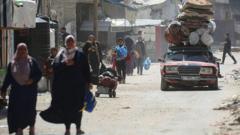Israel's Defense Minister Israel Katz has declared the expansion of "security zones" in Gaza to encompass the southern city of Rafah. This strategic move aims to isolate Palestinian civilians, pressuring Hamas to release hostages. The military's ongoing offensive has already displaced approximately 390,000 individuals, with two-thirds of Gaza classified as "no-go" zones. Despite evacuations, humanitarian aid remains obstructed, as the UN warns of critical shortages of essential supplies.
**Israel Expands Security Zones in Gaza to Include Rafah Amid Humanitarian Crisis**

**Israel Expands Security Zones in Gaza to Include Rafah Amid Humanitarian Crisis**
Israel's defense minister announces new military strategy focusing on Rafah as a means to pressure Hamas.
In a recent visit to Rafah, Katz emphasized the military's goal of making Gaza “smaller” and “more isolated," framing the operation as a necessary measure for national security. Following the military's orders for civilian evacuations, many residents of Rafah, which had around 280,000 inhabitants before the conflict, have fled. The recent military expansion now covers a vast section of Rafah, amounting to roughly 64 square kilometers and significantly impacting the local population.
The Israeli Defense Forces (IDF) have intensified their operations following the breakdown of a two-month ceasefire in mid-March. The UN has reported that displacement in Gaza has surged, with essential supplies including food and medicine running low due to restrictions on humanitarian aid deliveries since early March. During the recent conflict escalation, extensive damage has been inflicted upon Rafah, leaving large parts of the city in ruins.
As Israel continues to assert control over critical areas, it has also concentrated efforts on the “Philadelphi Corridor,” a strip of land near the Egyptian border intended to stem weapons smuggling. The Israeli government maintains that these military actions are aimed at protecting civilians and curbing Hamas's influence in the region. Yet, the relentless bombardment and evacuation orders face criticism for potentially violating international humanitarian laws, as various agencies report the dire conditions faced by the displaced populations.
While Israeli officials, including Katz, assert that the operations will expedite the release of hostages held by Hamas, the UN's warnings regarding humanitarian crises and international law violations continue to grow. The ongoing military campaign, having commenced in response to the deadly Palestinian attacks on October 7, 2023, has reportedly resulted in over 50,880 fatalities in Gaza, with the humanitarian situation deteriorating sharply.
As clashes persist, the dynamic in the region underscores the complex interplay of military strategy and humanitarian implications, prompting urgent international scrutiny and calls for a resolution to the ongoing conflict.
The Israeli Defense Forces (IDF) have intensified their operations following the breakdown of a two-month ceasefire in mid-March. The UN has reported that displacement in Gaza has surged, with essential supplies including food and medicine running low due to restrictions on humanitarian aid deliveries since early March. During the recent conflict escalation, extensive damage has been inflicted upon Rafah, leaving large parts of the city in ruins.
As Israel continues to assert control over critical areas, it has also concentrated efforts on the “Philadelphi Corridor,” a strip of land near the Egyptian border intended to stem weapons smuggling. The Israeli government maintains that these military actions are aimed at protecting civilians and curbing Hamas's influence in the region. Yet, the relentless bombardment and evacuation orders face criticism for potentially violating international humanitarian laws, as various agencies report the dire conditions faced by the displaced populations.
While Israeli officials, including Katz, assert that the operations will expedite the release of hostages held by Hamas, the UN's warnings regarding humanitarian crises and international law violations continue to grow. The ongoing military campaign, having commenced in response to the deadly Palestinian attacks on October 7, 2023, has reportedly resulted in over 50,880 fatalities in Gaza, with the humanitarian situation deteriorating sharply.
As clashes persist, the dynamic in the region underscores the complex interplay of military strategy and humanitarian implications, prompting urgent international scrutiny and calls for a resolution to the ongoing conflict.




















